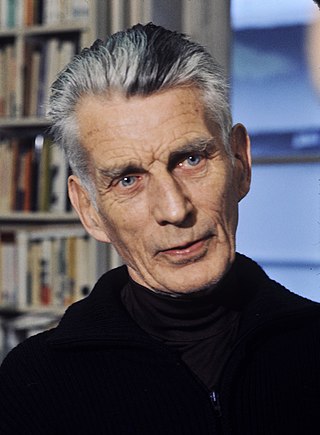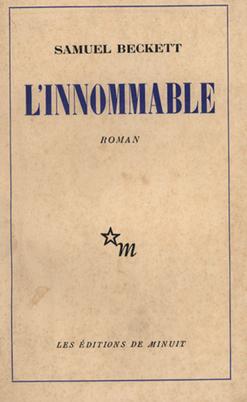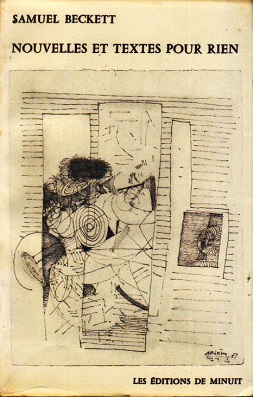
Samuel Barclay Beckett was an Irish novelist, dramatist, short story writer, theatre director, poet, and literary translator. His literary and theatrical work features bleak, impersonal and tragicomic experiences of life, often coupled with black comedy and nonsense. His work became increasingly minimalist as his career progressed, involving more aesthetic and linguistic experimentation, with techniques of stream of consciousness repetition and self-reference. He is considered one of the last modernist writers, and one of the key figures in what Martin Esslin called the Theatre of the Absurd.

Waiting for Godot is a play by Irish playwright Samuel Beckett in which two characters, Vladimir (Didi) and Estragon (Gogo), engage in a variety of discussions and encounters while awaiting the titular Godot, who never arrives. Waiting for Godot is Beckett's translation of his own original French-language play, En attendant Godot, and is subtitled "a tragicomedy in two acts".
Breath is a notably short stage work by Samuel Beckett. An altered version was first included in Kenneth Tynan's revue Oh! Calcutta!, at the Eden Theatre in New York City on 16 June 1969. The UK premiere was at the Close Theatre Club in Glasgow in October 1969; this was the first performance of the text as written. The second performance, and the English premiere, was at a benefit held at the Oxford Playhouse on March 8, 1970. “The first accurate publication appeared in Gambit 4.16 (1969): 5–9, with a manuscript facsimile.”
Act Without Words I is a short play by Samuel Beckett. It is a mime, Beckett's first. Like many of Beckett's works, the play was originally written in French, being translated into English by Beckett himself. It was written in 1956 following a request from the dancer Deryk Mendel and first performed on 3 April 1957 at the Royal Court Theatre in London. On that occasion it followed a performance of Endgame. The original music to accompany the performance was written by composer John S. Beckett, Samuel's cousin, who would later collaborate with him on the radio play Words and Music.
Play is a one-act play by Samuel Beckett. It was written between 1962 and 1963 and first produced in German as Spiel on 14 June 1963 at the Ulmer Theatre in Ulm-Donau, Germany, directed by Deryk Mendel, with Nancy Illig (W1), Sigfrid Pfeiffer (W2) and Gerhard Winter (M). The first performance in English was on 7 April 1964 at the Old Vic in London. It was not well-received upon its British premiere.

Krapp's Last Tape is a 1958 one-act play, in English, by Samuel Beckett. With a cast of one man, it was written for Northern Irish actor Patrick Magee and first titled "Magee monologue". It was inspired by Beckett's experience of listening to Magee reading extracts from Molloy and From an Abandoned Work on the BBC Third Programme in December 1957.
Rough for Theatre II is a short play by Samuel Beckett. "Although this discarded piece of theatre is dated 'circa 1960' in End and Odds, a manuscript from two years earlier exists in Trinity College, Dublin, Library. This situates a first version, written in French [as Fragment de théâtre II] and different from that eventually published in 1976 as between the English plays Krapp's Last Tape and Embers." It is rarely produced.
Roger Blin was a French actor and director. He staged world premieres of Samuel Beckett's Waiting for Godot in 1953 and Endgame in 1957.

Adrienne Corri was a Scottish actress.

Patrick George Magee was a Northern Irish actor. He was noted for his collaborations with playwrights Samuel Beckett and Harold Pinter, sometimes called "Beckett's favourite actor," as well as creating the role of the Marquis de Sade in the original stage and screen productions of Marat/Sade.

Molloy is a novel by Samuel Beckett first written in French and published by Paris-based Les Éditions de Minuit in 1951. The English translation, published in 1955, is by Beckett and Patrick Bowles.

The Unnamable is a 1953 novel by Samuel Beckett. It was originally published in French as L'Innommable and later translated by the author into English. Grove Press published the English edition in 1958.
That Time is a one-act play by Samuel Beckett, written in English between 8 June 1974 and August 1975. The play was specially written for actor Patrick Magee, who delivered its first performance on the occasion of Beckett's seventieth birthday celebration, at London's Royal Court Theatre on 20 May 1976.

Watt was Samuel Beckett's second published novel in English. It was largely written on the run in the South of France during the Second World War and was first published by Maurice Girodias's Olympia Press in 1953.

Stories and Texts for Nothing is a collection of stories by Samuel Beckett. It gathers three of Beckett's short stories and the thirteen short prose pieces he named "Texts for Nothing" (1950–1952). All of these works are collected in the Grove Press edition of Beckett's complete short prose. They were originally written in French and published in 1955 by Les Éditions de Minuit as Nouvelles et Textes pour rien, with a second edition illustrated edition published by the same publisher in 1958.
The Old Tune is a free translation of Robert Pinget’s 1960 play La Manivelle in which Samuel Beckett transformed Pinget's Parisians, Toupin and Pommard into Dubliners, Cream and Gorman. Its first radio broadcast was by the BBC Third Programme on 23 August 1960, directed by Barbara Bray with Jack MacGowran as Cream and Patrick Magee as Gorman.

Robert Alesch was a Catholic priest and collaborator with Nazi Germany during the Second World War.
"Imagination Dead Imagine" is a short prose text by Samuel Beckett first published in French in Les Lettres nouvelles in 1965. Its first English publication was a translation in The Sunday Times in 1965 followed by a trade edition by Beckett's London-based publisher, Calder and Boyars, later that year.
All Strange Away is a short prose text by Samuel Beckett first published in English in 1964. A special signed edition with illustrations by Edward Gorey was published in 1976, and in a trade edition by Grove Press of collected texts titled, Rockaby and Other Short Pieces in 1981. Beckett's British publisher, John Calder, also printed the work independently in 1979 and again, in 1990, in a collection of late prose works under the title, As the Story was Told.
David Warrilow was an English actor best known as one of the "finest interpreters of Samuel Beckett’s work".










